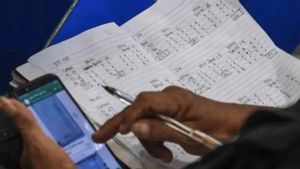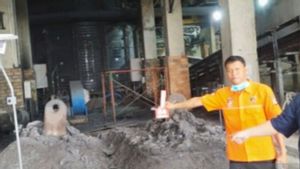JAKARTA - The 2020 Pilkada, which will be held on Thursday, December 9, is just a matter of time. The voting will be held in 9 provinces, 224 districts and 37 cities.
Different from the previous five years, this time the regional head elections were held in the midst of the COVID-19 pandemic. Many new things will be discovered by people who hold voting rights at polling stations (TPS) which are deliberately designed by the General Election Commission (KPU) to prevent transmission of COVID-19 during the voting process.
As shown on the KPU RI YouTube account, there are a number of new regulations in implementing safe voting for COVID-19 and must be followed by voters. First, voters who come to polling stations (TPS) are required to wear masks. Next, voters must maintain a safe distance.
Third, voters are required to wash their hands when they arrive at the TPS, when going to vote, and after voting at the hand washing facilities that have been provided.
Fourth, before entering the TPS, voters will have their body temperature measured. Voters with a high body temperature or more than 37.3 degrees Celsius will be invited to vote in a special voting booth.
Fifth, in order to prevent transmission through touch, voters are required to wear plastic gloves provided by the TPS committee when voting. Sixth, different from ordinary years, in the midst of this pandemic, people will no longer dip their fingers in election ink but only with a drop.
Seventh, the number of voters in one polling station will be limited to 500 people and the entire polling officer group (KPPS) will be required to wear personal protective equipment (PPE) in the form of a mask, face shield or face shield, and gloves to prevent transmission.
The eighth rule, there should be no crowds or physical contact at the polling stations, including shaking hands and others.
Ninth, in order to prevent exposure to the virus, each TPS will be sprayed with disinfectants periodically.
Finally, the voting hours of the voters will be set and this will be stated in the Voting Notification Letter. Through this letter, there will be information on voting time and an appeal for voters to wear masks, bring pens, and personal identities such as KTPs and KTP Recording Certificates. The 2020 Pilkada voting schedule on December 9 will start tomorrow at 07.00-13.00 local time.
It is also claimed that readiness for the elections has been carried out very well by various parties. Director General of Regional Autonomy of the Ministry of Home Affairs Akmal Malik said that this preparation was not only actively carried out by the government and state administrators.
However, this work is also being carried out in conjunction with the COVID-19 Handling Task Force which participates in coordination so that the preparation for the five-year contestation stage can run well and the public does not have to worry about channeling their voting rights.
"The public does not need to worry because the local elections have been carefully prepared, with various efforts so that people can avoid exposure to COVID-19," he said as quoted from his written statement to reporters, Monday, December 7.
"The task of the community is only to comply with health protocols, to come to the location on a schedule that has been determined by the KPU," he added.
Furthermore, Akmal reminded that community participation is very important in this regional election. The goal is that whoever the elected regional leader will have strong legitimacy.
"We need leaders who have strong legitimacy, we all agree to handle this COVID-19 together, in synergy. Together synergy requires participation," he stressed.
The KPU and the government may indeed prepare various ways so that the 2020 Pilkada is safe from the dangers of COVID-19. However, an epidemiologist from Australia's Griffith University, Dicky Budiman, assessed that the spike in COVID-19 cases still needs to be watched out for by taking various precautions.
He agreed that several existing methods such as regulating the arrival time of voters at the polling stations would be able to reduce the appearance of crowds. However, Dicky assessed that there is still one thing that is missing from the voting system, namely the COVID-19 test.
"Just do it, for example, the antigen rapid test the day before and given information later on who can come based on the test results. So this test is done at least three days before and a maximum the day before," said Dicky when contacted by VOI.
This test must then be repeated again after the community has finished voting and the results are entered into the data collection system in districts and regions.
"So in addition to the 3M health protocol, namely wearing masks, maintaining distance, and washing hands, this aspect of testing and tracing is important. Because the potential for cases to occur is quite clear," he said.
"In addition, each region must prepare its health facilities. So that if there is a spike in cases, it is part of that which must be prepared and risks that are difficult to avoid," he concluded.
The English, Chinese, Japanese, Arabic, and French versions are automatically generated by the AI. So there may still be inaccuracies in translating, please always see Indonesian as our main language. (system supported by DigitalSiber.id)









